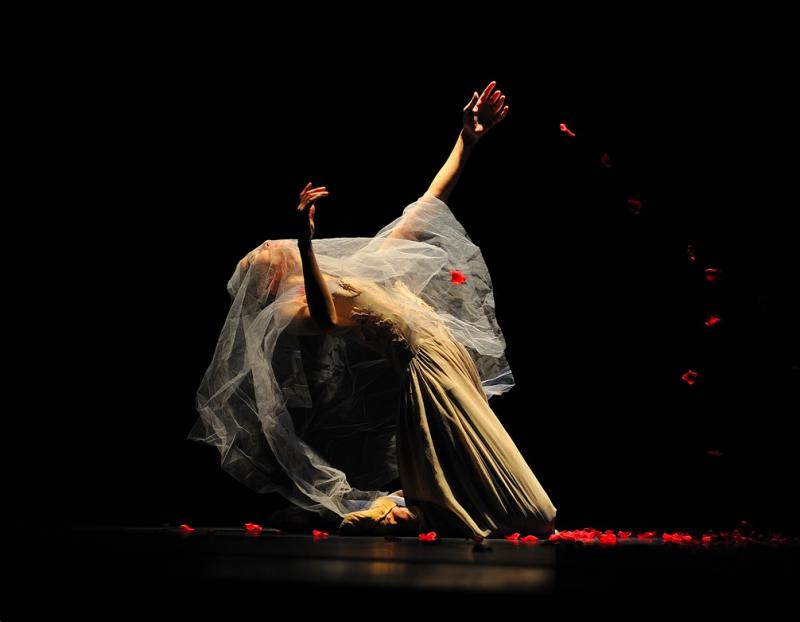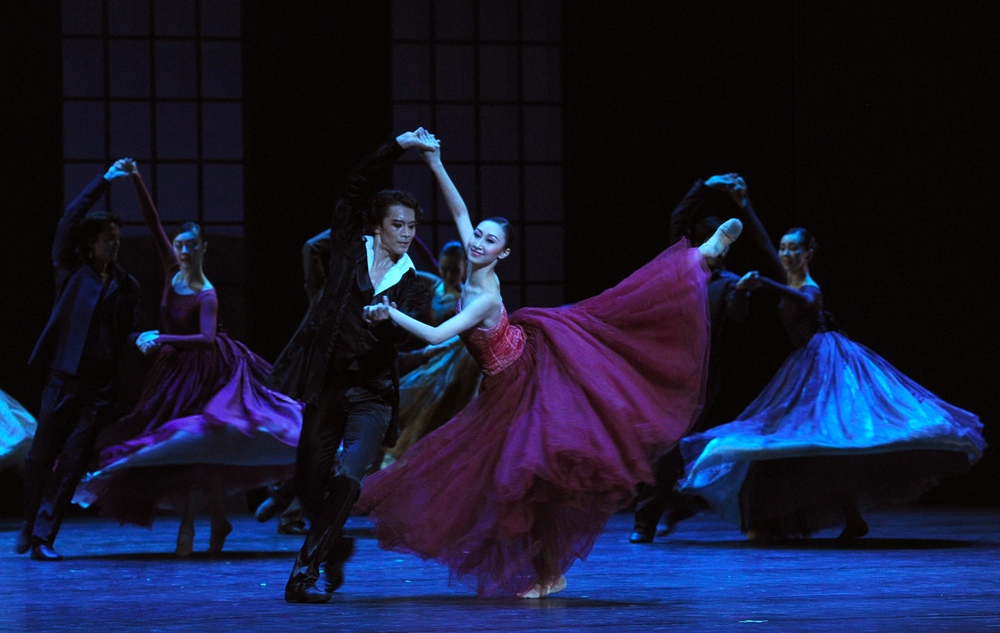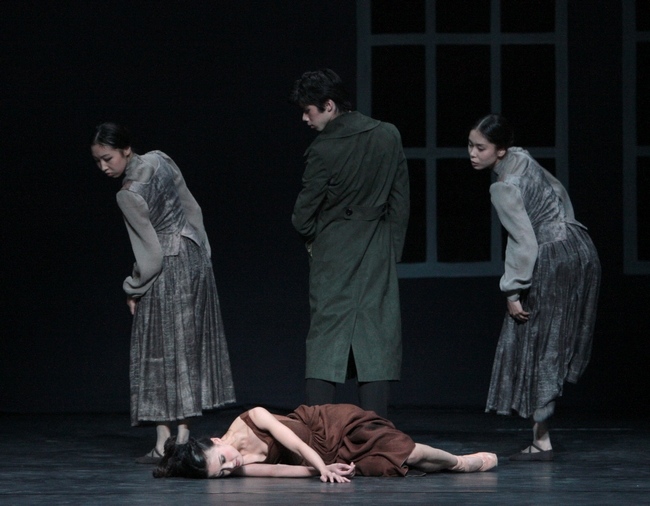Jane Eyre, Shanghai Ballet, London Coliseum | reviews, news & interviews
Jane Eyre, Shanghai Ballet, London Coliseum
Jane Eyre, Shanghai Ballet, London Coliseum
A brave Chinese ballet version of Brontë's romance misses the point

For their first visit to the UK, Shanghai Ballet have brought a narrative ballet based on a Chinese theatrical version of Jane Eyre. It focuses on Bertha Mason, Mr Rochester’s mad wife in the attic, whose fate has often troubled readers, though the Shanghai narrative does not ask about the economic and social conditions of exploitation, the colonialism and sexism that have trapped her.
Instead it presents Bertha, Jane and Rochester as three troubled souls in a kind of eternal love triangle. But Charlotte Brontë's classic is not a novel about a timeless dilemma, it is about a specific character’s psychological development; and by transmuting these individuals into types, the Shanghai Ballet treatment lost me.
A sense of dislocation is created by costumes and sets that gesture at various epochs while never committing to any one: Mrs Fairfax is in Victorian stripes and a bustle, but Jane’s elegant pinafore is Edwardian, while Rochester’s shiny black suit seems to have been borrowed from Mick Jagger circa 1977. Adding to the tragic, rather than novelistic, mood are the male dancers who cover the transitions between scenes, representing ghosts, rocks, or flames. Lit low so we cannot see their faces, and moving mostly in unison or simple alternation, they have more of the Greek chorus about them than a ballet corps.
The physical storytelling features a little too much running and hair-tossing
Their frenetic blend of martial art style and ballet, however, brought a welcome lift in tempo and energy, because choreographer Patrick de Bana has mostly gone for a token contemporary/ballet blend. This works best when it moves towards expressionism, or merges with Chinese traditional dance; at other moments the physical storytelling features a little too much running and hair-tossing.
Fan Xiaofeng as Bertha has to do a lot of both, but fortunately for us she is a magnetic dancer, committed to every movement, flickering constantly between fluidity and rigidity to convey Bertha’s distress, and commanding attention whenever she is on stage. To her are given some of the most visually striking tableaux: kneeling in a white dress in a shower of red rose petals; standing trying to claw her way out of a glass box; collapsed in a pool of orange light like a murder victim under a streetlamp.
 Her Bertha doesn’t show much psychological development, but she might be excused that, playing a madwoman; in Wu Husheng’s Rochester, though, emotional implausibility is a serious problem. The man from whose orbit two women cannot escape should have near-planetary gravity: instead he is boyishly handsome and seemingly impermeable, affected as little by near-death in a fire as by Jane’s healing return. His dancing is competent, but the one-register acting makes it hard even to dislike him for the villain he is supposed to be.
Her Bertha doesn’t show much psychological development, but she might be excused that, playing a madwoman; in Wu Husheng’s Rochester, though, emotional implausibility is a serious problem. The man from whose orbit two women cannot escape should have near-planetary gravity: instead he is boyishly handsome and seemingly impermeable, affected as little by near-death in a fire as by Jane’s healing return. His dancing is competent, but the one-register acting makes it hard even to dislike him for the villain he is supposed to be.
His lack of chemistry with Xiang Jieyan’s Jane is part of the problem; it’s surprising, since they are regular partners but at no point could I get a sense of why (or even if) Jane was attracted to this man. Xiang is a lovely dancer, neat and precise, but in making her Jane all passivity and resignation – there was no trace of the steely core of self-respect which gets her into trouble as a child and leads her to run away from Thornfield – she made it impossible for us to identify with her situation at all.
The ghost of Helen Burns is given mesmerising life by Li Chenchen
With large sections of the ballet focusing on the Jane-Bertha-Rochester triad, it was up to the secondary characters to inject some life and passion. Zhang Yao was tight, tense and accusatory as Richard Mason, Bertha’s brother, while Zhou Jiawen played Blanche Ingram with a dash of the southern belle, all sideways smiles at the ball (even Wu’s Rochester showed a flicker of interest, see picture above). St John Rivers was given a touching sincerity by Zhang Wenjun, his love for Jane entirely believable; in fact their pas de deux was the only one where Xiang’s Jane seemed to feel anything.
The ghost of Helen Burns – Jane’s childhood friend – is given mesmerising life by Li Chenchen, a dancer whose ability to saturate every movement with meaning should be a lesson to the principals; her short solo in the second act was also one of the few moments where I was convinced of dance as the medium for telling this story.
 A major flaw is the lack of a unified score: the music is advertised in the programme as being by "Elgar, Britten, Dowland, Debussy, Barber, de Maistre, Villa-Lobos etc" - what we heard was mostly (recorded) chamber music for strings, or Spanish classical guitar, but nothing that helped to give the story momentum or add depth to the characters, while the deployment of instantly recognisable pieces like Clair de Lune or the Adagio for Strings or (oh dear) Greensleeves at significant moments only undermined the drama.
A major flaw is the lack of a unified score: the music is advertised in the programme as being by "Elgar, Britten, Dowland, Debussy, Barber, de Maistre, Villa-Lobos etc" - what we heard was mostly (recorded) chamber music for strings, or Spanish classical guitar, but nothing that helped to give the story momentum or add depth to the characters, while the deployment of instantly recognisable pieces like Clair de Lune or the Adagio for Strings or (oh dear) Greensleeves at significant moments only undermined the drama.
It is brave of Shanghai Ballet to bring Jane Eyre to Charlotte Brontë’s homeland. Can you imagine Birmingham Royal Ballet taking an Anna Karenina ballet to Moscow? (In fact, do look out for reviews of Scottish Ballet, who take their award-winning A Streetcar Named Desire to the USA next season). However, England is the home not just of the moorland novel, but of the psychologically complex narrative ballet that this Jane Eyre aspires to be. It may be a triumph of diplomatic relations, but to audiences raised on Kenneth MacMillan, this ballet is just too bland to convince.
Watch Shanghai Ballet's trailer for Jane Eyre, by Patrick de Bana
rating
Explore topics
Share this article
Add comment
The future of Arts Journalism
You can stop theartsdesk.com closing!
We urgently need financing to survive. Our fundraising drive has thus far raised £49,000 but we need to reach £100,000 or we will be forced to close. Please contribute here: https://gofund.me/c3f6033d
And if you can forward this information to anyone who might assist, we’d be grateful.

Subscribe to theartsdesk.com
Thank you for continuing to read our work on theartsdesk.com. For unlimited access to every article in its entirety, including our archive of more than 15,000 pieces, we're asking for £5 per month or £40 per year. We feel it's a very good deal, and hope you do too.
To take a subscription now simply click here.
And if you're looking for that extra gift for a friend or family member, why not treat them to a theartsdesk.com gift subscription?
more Dance
 'We are bowled over!' Thank you for your messages of love and support
Much-appreciated words of commendation from readers and the cultural community
'We are bowled over!' Thank you for your messages of love and support
Much-appreciated words of commendation from readers and the cultural community
 R:Evolution, English National Ballet, Sadler's Wells review - a vibrant survey of ballet in four acts
ENB set the bar high with this mixed bill, but they meet its challenges thrillingly
R:Evolution, English National Ballet, Sadler's Wells review - a vibrant survey of ballet in four acts
ENB set the bar high with this mixed bill, but they meet its challenges thrillingly
 Like Water for Chocolate, Royal Ballet review - splendid dancing and sets, but there's too much plot
Christopher Wheeldon's version looks great but is too muddling to connect with fully
Like Water for Chocolate, Royal Ballet review - splendid dancing and sets, but there's too much plot
Christopher Wheeldon's version looks great but is too muddling to connect with fully
 iD-Reloaded, Cirque Éloize, Marlowe Theatre, Canterbury review - attitude, energy and invention
A riotous blend of urban dance music, hip hop and contemporary circus
iD-Reloaded, Cirque Éloize, Marlowe Theatre, Canterbury review - attitude, energy and invention
A riotous blend of urban dance music, hip hop and contemporary circus
 How to be a Dancer in 72,000 Easy Lessons, Teaċ Daṁsa review - a riveting account of a life in dance
Michael Keegan-Dolan's unique hybrid of physical theatre and comic monologue
How to be a Dancer in 72,000 Easy Lessons, Teaċ Daṁsa review - a riveting account of a life in dance
Michael Keegan-Dolan's unique hybrid of physical theatre and comic monologue
 A Single Man, Linbury Theatre review - an anatomy of melancholy, with breaks in the clouds
Ed Watson and Jonathan Goddard are extraordinary in Jonathan Watkins' dance theatre adaptation of Isherwood's novel
A Single Man, Linbury Theatre review - an anatomy of melancholy, with breaks in the clouds
Ed Watson and Jonathan Goddard are extraordinary in Jonathan Watkins' dance theatre adaptation of Isherwood's novel
 Peaky Blinders: The Redemption of Thomas Shelby, Rambert, Sadler's Wells review - exciting dancing, if you can see it
Six TV series reduced to 100 minutes' dance time doesn't quite compute
Peaky Blinders: The Redemption of Thomas Shelby, Rambert, Sadler's Wells review - exciting dancing, if you can see it
Six TV series reduced to 100 minutes' dance time doesn't quite compute
 Giselle, National Ballet of Japan review - return of a classic, refreshed and impeccably danced
First visit by Miyako Yoshida's company leaves you wanting more
Giselle, National Ballet of Japan review - return of a classic, refreshed and impeccably danced
First visit by Miyako Yoshida's company leaves you wanting more
 Quadrophenia, Sadler's Wells review - missed opportunity to give new stage life to a Who classic
The brilliant cast need a tighter score and a stronger narrative
Quadrophenia, Sadler's Wells review - missed opportunity to give new stage life to a Who classic
The brilliant cast need a tighter score and a stronger narrative
 The Midnight Bell, Sadler's Wells review - a first reprise for one of Matthew Bourne's most compelling shows to date
The after-hours lives of the sad and lonely are drawn with compassion, originality and skill
The Midnight Bell, Sadler's Wells review - a first reprise for one of Matthew Bourne's most compelling shows to date
The after-hours lives of the sad and lonely are drawn with compassion, originality and skill
 Ballet to Broadway: Wheeldon Works, Royal Ballet review - the impressive range and reach of Christopher Wheeldon's craft
The title says it: as dancemaker, as creative magnet, the man clearly works his socks off
Ballet to Broadway: Wheeldon Works, Royal Ballet review - the impressive range and reach of Christopher Wheeldon's craft
The title says it: as dancemaker, as creative magnet, the man clearly works his socks off
 The Forsythe Programme, English National Ballet review - brains, beauty and bravura
Once again the veteran choreographer and maverick William Forsythe raises ENB's game
The Forsythe Programme, English National Ballet review - brains, beauty and bravura
Once again the veteran choreographer and maverick William Forsythe raises ENB's game

Comments
If you interpret Bertha as